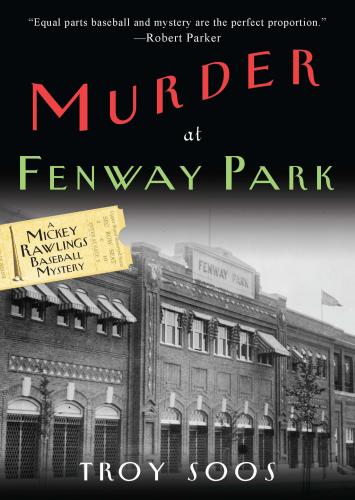MURDER at FENWAY PARK
TROY SOOS
KENSINGTON BOOKS
All copyrighted material within is Attributor Protected.
Table of Contents
Title Page Chapter One Chapter Two Chapter Three Chapter Four Chapter Five Chapter Six Chapter Seven Chapter Eight Chapter Nine Chapter Ten Chapter Eleven Chapter Twelve Chapter Thirteen Chapter Fourteen Chapter Fifteen Chapter Sixteen Chapter Seventeen Chapter Eighteen Chapter Ninenteen Chapter Twenty Chapter Twenty-One Chapter Twenty-Two Chapter Twenty-Three Chapter Twenty-Four Chapter Twenty-Five Chapter Twenty-Six Chapter Twenty-Seven Copyright Page
Chapter One
You’ve probably never heard of me, but I’m in the Hall of Fame. The Baseball Hall of Fame. The Hall of Fame. Well ... actually I’m in the museum. I was never officially inducted into the shrine like my old teammates Babe Ruth and Cy Young, but I did play big-league baseball and my picture’s in Cooperstown to prove it.
I was making my first visit to the quiet lakeside village in upstate New York. It was the last Sunday in July, the day of the annual Hall of Fame ceremonies. As part of the festivities, the Red Sox and the Chicago Cubs were scheduled to play an exhibition game. That’s why I was here. As the oldest former member of both clubs, I had been invited to throw out the opening pitch.
About a year and a half ago, some trivia buff went through the record books and found that the oldest ex-major-leaguer was an unheralded utility player named Mickey Rawlings. That’s me. Unheralded.
Soon after this momentous discovery, I started getting requests to appear at everything from old-timers games to Little League banquets. I was flattered by the unfamiliar attention, although I didn’t quite understand it. As far as I can tell, being the oldest living ex-whatever is not a record of outstanding achievement. There isn’t even a question about whether my “record” will be broken—some other codger will inherit my title the minute I kick off.
Anyway, along with the real dignitaries, I sat on a bunting-draped platform in front of the stately Baseball Library. Several thousand folding chairs were neatly arrayed on the sprawling lawn in front of me. They were filled by an eager crowd of baseball pilgrims who came to see the latest additions to the National Pastime’s pantheon. The atmosphere felt like baseball: the air clean and crisp, but not chilly; the grass vibrant outfield green; the sky a light shade of Dodger blue, set with a glowing golden sun.
The ceremonies began with the baseball commissioner giving a long speech about tradition. As he spoke of the heroes of the past and the popular stars of the present, the sky seemed to grow darker and the sun dimmer. I slipped into a fretful mood, suddenly aware that I was out of place here. Baseball tradition ... Baseball tradition had skipped over me.
No one remembers seeing me play, no one even recognizes my name—it always has to be followed by the “oldest living player” identification. That description itself seems redundant—does anyone care who the oldest dead player is?
With Hall-of-Famers all around me, I felt conspicuous in the trivial nature of my distinction. I imagined that the crowd noticed it, too, and they seemed to stare at me, silently accusing me of being an imposter. I squirmed in my seat, and twisted slightly to the side, trying in vain to duck out of view. The crowd was right: I didn’t belong up here with the game’s greatest.
When the commissioner introduced this year’s inductees, I realized that I didn’t even belong among the fans. I knew almost nothing about the three men whose plaques were being added to the Hall of Fame. They had been stars—excuse me, superstars—in the 1970s, during which decade I watched about five games on television and attended none.
While their thank-you speeches and hackneyed anecdotes droned on, I wondered how baseball and I could have grown apart. For most of my life, horsehide and ash were as much a part of me as skin and bone. Now I found myself estranged from baseball, barely recognizing the game I used to know so intimately. The modern game just isn’t the one I remember. New teams are playing indoor baseball in domed stadiums, old teams have moved to new cities. The grass is plastic, the light’s electric. Hell, the ball isn’t even horsehide anymore, and most of the bats are aluminum....
A barrage of sustained applause shook me out of my grousing and marked the conclusion of the enshrinement rites.
With an hour to go before the exhibition game, I slipped off on my own. I first wandered into the Hall of Fame wing of the main building, skeptically wondering what sort of “fleet-of-foot” runners, “heavy-hitting” batsmen, and “iron-armed” pitchers I would find there.
The high-ceilinged gallery consisted of a rectangular hall with alcoves built along two walls. The room contained no furnishings or exhibits other than the bronze plaques that were displayed on the alcove walls, one tablet for each man voted into the Baseball Hall of Fame. The gallery was crowded but quiet: visitors tread softly on the tile floor and spoke in the hushed whispers usually reserved for churches and libraries.
I found myself facing a plaque of Ty Cobb, the first baseball player to be enshrined here. The bronze bas-relief showed a grinning man in a Detroit cap. Many times I had seen Cobb sneer, but I don’t think he ever grinned in all his life. The artist who drew him was generous to Cobb in portraying him with such pleasant features—almost as generous as the author who omitted any mention of Ty Cobb’s personality in writing the plaque’s text.
I moved along, picking out the bronze images of my contemporaries. There was Walter Johnson, the gentle
